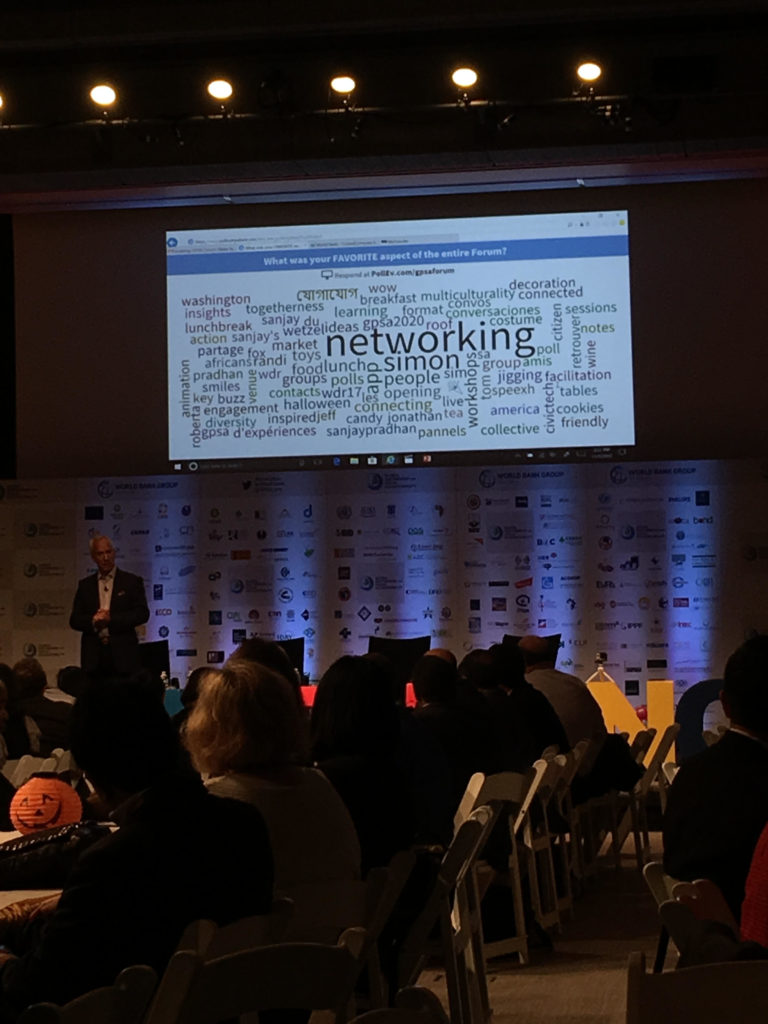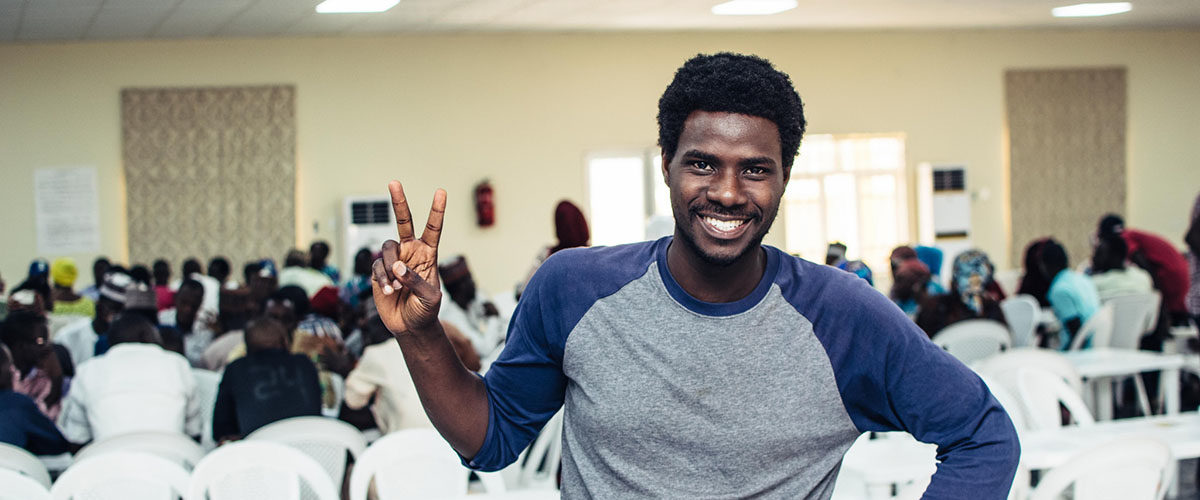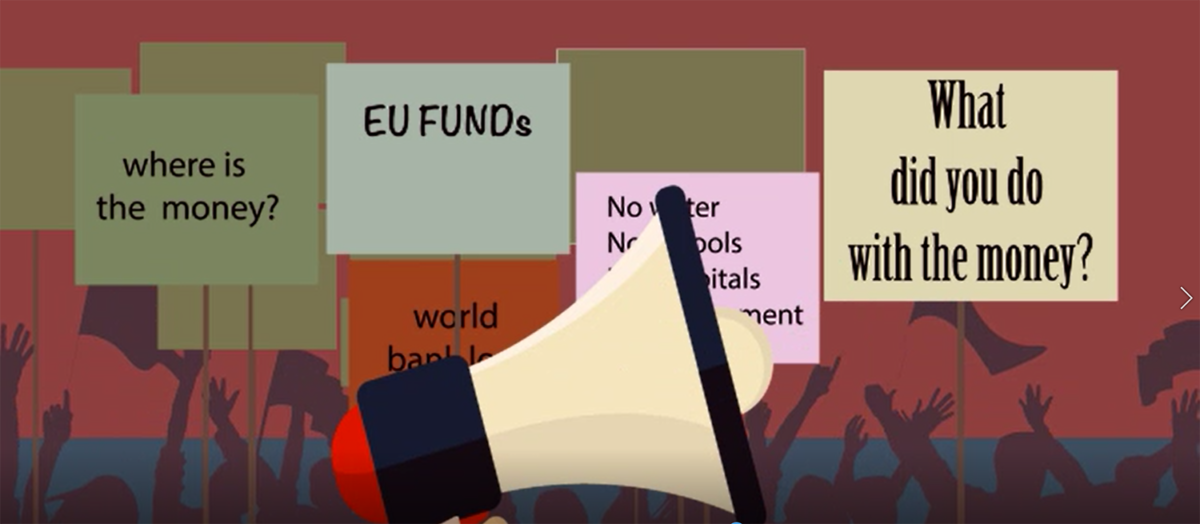The Third most downloaded World Bank document is the 2016 World Development Report titled Governance and Law. Perhaps, for two reasons – There is a significant drop in trust for the government of countries (both developed and developing), as such citizens and government are curious about how to strengthen governance while upholding the rule of law. Secondly, there are now more people having access to the internet.

“Corruption undermines development. We are committed to radical transparency to solve government problem especially in service delivery” said Jim Yong Kim, President of The World Bank Group at the opening of the 4th Global Partnership for Social Accountability Forum held between October 30 – November 1 at the World Bank Headquarters. 250 expected participants flew over 50 countries and attended ten plenary sessions. My initial thoughts were what can the bank do differently, especially with political distrust in governance, and the quest for people to survive, rather than hold government accountable by grassroots mobilization or the use of technology (where it is affordable and useable). Amidst networking and meetings, I pulled off these takeaways, while hoping the bank, its lenders and monitoring teams will take heed. If you are paranoid or feeling Jiggy like me, please feel free to add your comments as well, maybe relief will come, after our medicine.
- For citizens to trust the government, the government needs to become politically accountable, and it will not happen overnight. However, significant progress can be made if the bank can create new metrics to provide loans for its borrowers (government of countries who still live large at the expense of their poor citizens). If there is less trust in government, the resultant will also be in the Bank as well. Perhaps, it might be pertinent for the Bank to re-initiate its approach of giving more emphasis to building capacity and institutions within developing countries. The Bank itself needs to start talking to political power by proposing policies that must address the underlying conditions that create corrupt incentives as highlighted by Michael Johnston in the Syndrome of Corruption
- In some of the discussions regarding technology, it affirms my experience working with government institutions in Sub Saharan Africa, that capacity to implement remains low. In my last evaluations of four countries in Africa, only Cape Verde has government official email. That’s not encouraging. The government in Sub Saharan Africa still lacks fundamental skills relevant to today’s business. It means government response to citizens yet entails the traditional method. It means the ease of doing business with prospective investors and regulation of private sectors remain tasking for both sides. Metrics could be developed on ensuring performance metrics of government officials are made available by countries requesting financial instruments from the bank. Radical civil service reforms like the thoughtful reshuffling of personnel and recruitment practices could be encouraged.
- The Civil Society Space is becoming endangered. Only 26 countries in the world allow people to freely share opinions, robustly debate ideas and hold those in power to account. “Government are thinking social accountability noise is becoming more and more, and also it’s becoming uncomfortable to the traditional development enterprise” Tom Carothers, Senior Vice President for Studies at the Carnegie Endowment for International Peace mentioned during the closing panel of the forum. We might want to think that when the civil society has more capacity than that of the government, the government gets frustrated, and resort to delegitimizing them – a case we have seen in most countries coming up with new regulations to shut down civil societies. There are growing threats, more than before. Non-Government Organizations and Civil Society Organizations might need to strengthen their legitimacy while aligning their strategies to be more social movement focused, in a way where the marginalized they speak for, act as advocates for themselves. How can the international community help? Already there are international principles protecting civil society around the world, I will think international financial institutions should step up enforcement in this regards, so this instrument might not just serve as paper documents!
- Technology is a tool and not the end while Social Media is not Social. In Africa, only 3 out of every 10 people have access to the internet while 2 out of 10 are on Facebook. This means a larger percentage of the population are left out on access, and maybe, affordability. What this might mean to me might be that a significant amount of people that vote during elections, might not have access to these tools to mobilize themselves. But who mobilized them at first to go to the poll? How can we learn from that, and use the same way to mobilize citizens to hold their leaders accountable? Whether we still need to rely on offline technologies to mobilize people. Prints, radio and TV – That’s the real work for civil society organizations. In sub-Saharan Africa, 8 in 10 people have mobile phones. Not smartphones. But the silicon valley has moved 100 times farther away from its bottom billion, failing to realize that the feature phones remain ubiquitous in the hands of these people that we need to move out of poverty. When we can mobilize more people, “living no one behind”, perhaps the government will respond.

What Participants said was their favourite aspect of the forum
Meanwhile, we should not let it look like demanding social accountability is going to be easy. It is easier where the literacy level is high. I guess. We must start from somewhere! It starts with people exchanging knowledge and networking in a forum like this. I will like to read your thoughts as well, and I look forward to reading your comments below.

